
The war was almost over but we didn’t know it yet. I was still in bed. It was dark, but there was already a thin ribbon of yellow forming on the horizon, I knew. I could hear our cow lowing. I should’ve been in the barn fifteen minutes earlier, milk pinging against the dented metal bucket. My father was already out in the fields. Suddenly there was a flash and my room lit up like lightning had come right through the window. I felt the ground tremble beneath my bed. Then it all faded away and the world was still. What birds had started to sing went quiet. Even the air seemed to have frozen.
I got up and went to the kitchen. My mother was looking out the window to the south, toward Carthage, where we all knew the government was working on some new weapon to use against the Japanese now that Germany had surrendered. My father came in, already sweating a little. “There’s a big cloud in the sky,” he said. “Whatever they were doing—all those explosives—they must’ve accidentally blown them up. Good God almighty, it must be bad down there.”
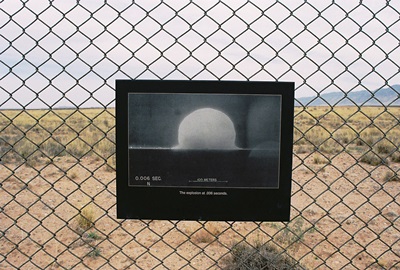
After that, we didn’t hear a thing from anyone. No Army men came to offer an explanation and our neighbors—those few that hadn’t been bought out by the government—didn’t know anything either. We speculated about the “accident” for a couple weeks. Then it suddenly became clear that what had happened that morning a few dozen miles south of our farm was no accident at all.
That was just before the monsoons came. I was 19 years old. Now I wonder if there was something about the bomb that made it rain like that. Out here we’re used to getting good, hard rains day after day in the late-summer. Every living thing in the desert needs the monsoon and welcomes it. Back then, those years when it didn’t come could be read in the clenched jaws and sunken eyes of the men at the Texaco Station looking for work or a ride out farther West. But that year the rain seemed angry, like it was throwing itself at the earth. Every afternoon the acequias would spill over and cars would slip off muddy roads and into flooded ditches. More than one person was swept away and drowned while crossing through the canyons and arroyos. Our fields lay under an inch of water and my father would sit at the kitchen table smoking cigarettes and listening to the radio, idled. Generations of experience had taught everyone to get their crops in before late-July, so at least our livelihood wasn’t wiped-out.

Then August was nearly over. People were euphoric now that the war was won and the men were coming home. The monsoon tapered off and the sky brightened. The air was crisper with fall approaching. Billy and Janie were my best friends. We’d all grown up together. First as kids in grade school, then teenagers, and now as young adults trying to grow into a strange new world. I guess it’s common to get crushes for the girls you grow up with, but I was probably 16 when I realized that I might really be in love with Janie. I was 17 when I figured out that Billy probably was, too. I’d lie in bed at night, sometimes for hours, rehearsing how I was going to tell her what I felt. I was certain she felt the same and believed that her every word and look contained some hidden message meant only for me. But there was Billy to consider. And I was young. And I was scared.
Eventually I started to notice that something was changing between Billy and Janie. She’d grab his arm and look at him in a way that was new to me. He’d hand her his cigarette and she’d inhale deeply, then giggle and give it back to him. He’d grin madly and then glance over at me and that grin would fall off his face. I started feeling a jealousy that went beyond what I’d known on the ball fields and playgrounds. Once I asked him if he was going steady with her and he looked at me strangely and said, “Naw, naw. We’re just good friends. Like you and her, too.” But I guess I knew. I stopped rehearsing my romantic soliloquies.
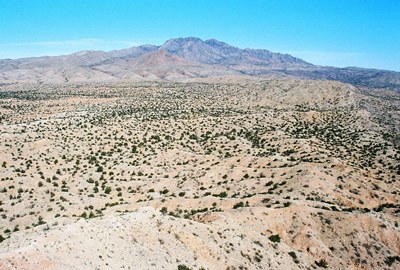
Now that the monsoons were lessening, we decided to spend the night up at the old cabin Janie’s father had built when she was a baby. It had been cut-off while the arroyos were flooded and we could use going up there to check on things as an excuse for getting away. It was nice in the forest, surrounded by pinyon and juniper, the hills rolling on every side, the air fresh and clean like you don't feel it anymore.
We went up in Billy’s 1938 Ford sedan. He’d bought it used from a neighbor with money he’d saved for years working on farms and doing odd jobs. He was proud of it, mainly because it wasn’t a pick-up truck, I think. More than any of us, Billy wanted to get out of the country and into the city. Not just Albuquerque, but Chicago, New York, Los Angeles. “That’s where things are really happening,” he’d say.
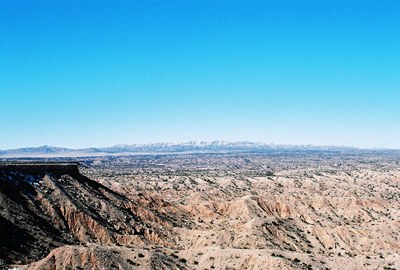
The only way to Janie’s cabin was by following the sandy arroyo beds, sometimes deep below their steeply cut banks. The arroyos were dry now and the Ford bumped along as we laughed and joked. Billy had brought some whiskey and I was surprised to see him pass it to Janie. But she took a swig and coughed, then laughed happily as she handed it back to me. It burned as it went down, but in the last year I’d grown to like that feeling. I passed it back to Billy as the warmth spread through my stomach.
When we neared the cabin we saw flashes on the horizon. A faint throb of thunder echoed through the canyons. We all looked at the sky and even over the taller hills we could see the thunderheads. “I hope no one has any plans for the evening,” Billy said. Janie giggled and I laughed, too. I liked the idea of spending a night in front of the fire with my friends as the rain beat against the cabin's tin roof.
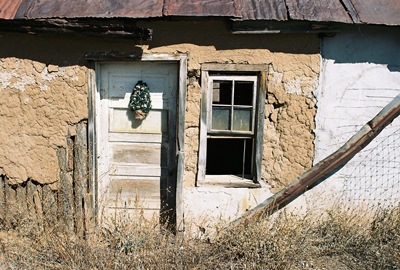
The cabin had weathered the monsoon just fine and we loaded in some food and extra blankets. It was starting to get colder now, especially in the early morning hours. There was still plenty of firewood stacked along the side of the cabin and as the first big droplets of rain began to fall we brought some of the wood inside and started a fire.
The rain grew steadily harder as the sun started to set. We ate some dinner and talked about what we hoped to achieve for ourselves during the fall. But, slowly, the conversation died as the rain kept coming. I looked out the front window and saw the arroyo starting to run. I suddenly felt unsettled. Janie was sitting close to Billy and while they weren’t talking now or even looking at each other, I became angry.
I opened the door and walked outside to stand under the awning and watch the rain. In a few minutes, Billy came out. “Janie wanted me to ask you what’s wrong,” he said. I looked at him and then looked back at the steadily filling arroyo. “I’m fine.” A bolt of lightning flashed and thunder rolled. “You aren’t afraid?” he laughed. I looked at him again but didn’t say anything. Billy glanced up at the darkening sky and then back at the arroyo. “I hope that’s down by tomorrow,” he said. “My dad will kill me if I’m not back in time to go with him to the lumber yard.” I lit a cigarette but didn’t say a word. Finally, Billy said, “She makes her own decisions, you know.” I held the smoke in my lungs and it started to burn. “I never told her how to feel.” Then he went inside and I exhaled quickly, feeling sick to my stomach.
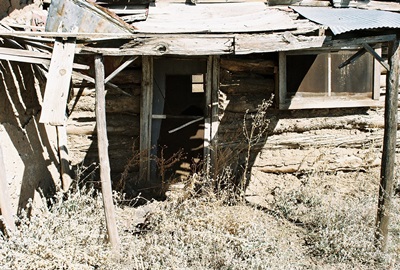
As it got dark the rain began to taper off but the arroyo ran deeper and faster with run-off from the hills. Things felt tense in the cabin and I was uncomfortable. I wondered what they’d said about me, if Janie knew I loved her, and, if so, how long had she known. Did they take it seriously? Did they laugh at me when I wasn’t around? I couldn’t say. But no one was laughing as we quietly watched the fire burn to embers.
“Janie, why don’t you go get some more wood for the fire?” Billy finally asked. Janie looked at him like he was crazy. “I’m not getting any wood. It’s cold and wet and muddy out there. You’re the men, you guys get it.” Billy hesitated a moment and then said, “Us men need a minute or two to talk something over.” I couldn’t put words to what I saw flash in Janie’s eyes, but she stood up, put on her jacket and walked out the door.
When the door closed, Billy ran a hand through his greased-back hair. “Listen, I think you should know what Janie…” Suddenly we heard Janie scream and we both jumped up and were out the door in an instant. We got to the side of the house in time to see the biggest diamondback rattlesnake I’d ever seen slither across the wet sand and away into the clumps of grama grass. It was almost dark now, but there was light from the cabin windows and open door. Janie was lying on the ground holding her wrist, crying and moaning. Billy and I bent down to look. He pulled Janie’s hand away and we could see the two punctures, the flesh already turning reddish-purple around the bite. “The snake was in the woodpile…” I said, but Billy was running inside to get the car keys.
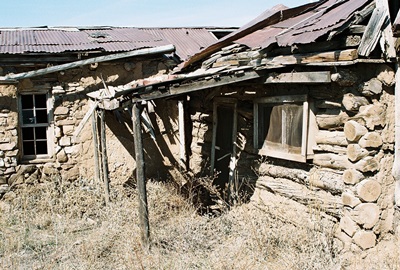
We helped Janie into the car. Already she couldn’t move her legs very well and her face had turned white. Her breathing was shallow. She’d stopped crying, but that didn’t seem to be a good thing. I could see that the arroyo was almost over its banks. “Billy,” I said, “How are we getting out? The arroyo is flooded.” “I’ll have to drive along the bank. She won’t make it very long.” I nodded and began to get in the car but Billy stopped me. “You stay here,” he said. “We’ll get you tomorrow.” I felt as if the entire world was suddenly falling away. “You’re not leaving without me!” I yelled, making a step back toward the car. But before I knew it, Billy had drawn his fist back. I felt it connect, but that was all.
I came to on the ground and although it must’ve been cold and muddy and wet, I felt warm. I couldn’t seem to wake up, like when you’re in a comfortable bed on a cold winter’s day and your eyes just won’t stay open. I struggled and slowly the intense burn that ran from my jaw to my temple brought me around. I sat up and saw the red and white tail lights of the Ford bumping slowly along the bank of the arroyo, Billy trying to navigate around the larger trees and bushes. Suddenly the tail lights tilted and the sodden bank started to crumble. Then one red arrow was on top of the other and then they changed positions and disappeared as the car flipped and went under the water.
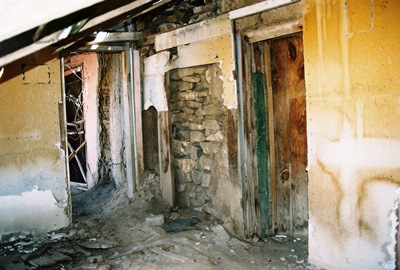
I got up and ran as fast as I could, slipping in the mud. It took only a couple minutes to get to the car. The wheels were still turning and steam was rising from the exhaust. Billy’s door was pinned up tight against the opposite bank. Nothing seemed to be moving inside. I jumped onto the underside of the car, just inches above the rushing torrent, and leaned over, trying to find the latch on Janie’s door. The water was frigid and the current strong. I couldn’t reach the handle so I lowered myself over the side. It was so cold it took my breath away. I could feel my heart beat in my throat and I struggled to keep from passing out. My feet touched the sandy bottom and, holding onto the undercarriage with one hand to keep from being swept away, I found the door handle and pulled with all my strength. It wouldn’t open. I pulled and pulled. Maybe the top of the door was stuck in the sand. Janie was probably unconscious by then. I didn’t know what had happened to Billy. There was no sound at all from inside the car. I kept pulling but soon I couldn’t feel my hands or feet.
I don’t know how long I was in the water, but when I hauled myself out I was crying. I began to shiver uncontrollably. At that point I knew that, surely, both Billy and Janie were drowned. I stumbled back to the cabin, knowing I’d go hypothermic if I didn’t get warm quickly. I had to get more wood from the woodpile. Then, shivering uncontrollably, my skin blue, I lit a fire and took off my clothes. I wrapped myself in a blanket and waited for the life to come back into me. I’m not sure it ever did.
When I was warm enough I started walking, still wrapped in the blanket, past the car, the wheels stopped and the engine cold now, following the churning muddy arroyo carrying twigs and debris toward the highway. It took almost two hours and when I got to the road it was still dark and there wasn’t much traffic. I waited on the shoulder as the sun broke over the horizon. Finally, a farm truck approached and I waved the man down. I have no idea what I said to him, but before long groups of men were running along the muddy bank of the arroyo, a beat-up tow truck following behind as others cleared a path.

I was taken to the hospital and soon my family was there, saying, “Poor, sweet Janie.” “This was no one’s fault,” my father said in a thick, stern voice. My mother, crying while she looked down at me in the bed, her tears falling on my own face, said that Billy was very brave. No one ever asked me why I wasn’t in the car with them.
Things went about as you’d expect after that, although they never did haul Billy’s car out of the woods. After a few days men started to come and take what they could. Wheels, axles, the transmission. I didn’t blame them. I never moved away, although I guess I should have. This land is in my blood, for better or worse. I did get married. I had two kids, a boy and a girl. They’re grown and moved away with their own families now. My wife, Maggie, has been dead three years. It’s been mostly a good life, but I don’t know that I ever loved my wife as I should’ve. I don’t necessarily believe that Janie and I would be together today. Maybe Billy would’ve married her. I know he understood that if he let Janie die he wouldn’t have wanted to go on living. But I don’t understand why he didn’t see that I would feel the same way. In the end, I lost both of them and something else, too.
I guess that’s why I’m up in this arroyo again. No one could count the hours I’ve spent here. The old cabin fell into disrepair years ago. The roof caved in sometime in the ‘70’s. Billy’s mangled Ford is still nearby, too. It eventually slid back down the sandy embankment and with every monsoon season it gets shoved a bit farther downstream. Some seasons I lose it for a while, but I always find it eventually. I admit that I’ve occasionally had the notion that it leads me back to itself. Right now it’s on a sandbar, hidden behind a clump of juniper, rusted and beaten past recognition. I know I shouldn’t be here, but there are things that happen in your life and sometimes you can’t really get beyond them. Not ever.

For once I don't owe Phil Varney a thing. All information for this post came from me and the wilds of the great state of New Mexico.
12 comments:
I’m curious about the origin of the text for your blog article you used since it’s not cited. NM Hwy 380 has its share of ghosts and ghost towns: Carthage, Tokay and Farley, not to mention many ranches in the area.
Information about the ghost town of Carthage http://www.ghosttowns.com/states/nm/carthage.html
Map location of Old Carthage http://www.mapquest.com/maps?city=Old%20Carthage&state=NM
Cemetery of Old Carthage – some info on Tokay and Farley
http://www.findagrave.com/cgi-bin/fg.cgi?page=cr&CRid=37984
Schmidt-McDoland Ranch House
http://en.wikipedia.org/wiki/McDonald_Ranch_House
CoastConFan, that is a wonderful question. The story is entirely based in real locations. The protagonist's ranch house I've placed well north of Carthage. If you've driven the Quebrada Byway, you've probably seen the large ranches scattered all around the north side of Hwy 380. However, I'm actually thinking farther north than that, up around the Sevilleta National Wildlife Refuge. Just south of the refuge boundary is a place called the Old Stapleton Ranch. I did a post on it HERE. But I also had some of the farms and ranches south of Highway 60, on the very eastern boundary of the refuge, in mind as neighbors, not far from Abó Ruins and Mountainair.
The arroyo where the car photo was taken and which I'm basically describing in the story starts on the refuge and winds down out of the pinon and juniper forest to Highway 60. You can still drive from the Old Stapleton Ranch to this area using very old, rough gravel roads.
The photos don't ALL fit the area tightly, however. The landscape shots are actually from the west side of the Sevilleta National Wildlife Refuge. One shows the Sierra Ladrones and the other has a feature called West Mesa to the left of the frame. That would be Mount Taylor in the distance. The cross made of pipe marks the grave of a man killed in a wagon accident. It's also on the west side of the refuge.
The cabin photos were taken near Estancia, NM. The remains of the rock house in the third photo are from the Trinity Site. I believe that's one of the farmhouses vacated when the Manhattan Project got underway.
Again, I'm thrilled you asked about the locations. Thanks for being interested! JM
Ah, it's your work then. Excellent indeed and I am impressed with your narrative. Make sure you take credit where it is due! I couldn't help but feel a familiarity with the story, probably because I feel a link to the narrative of landscape and of the people. Maybe that's why I like Cormac McCarthy's works so much. Keep writing.
Thank you, CoastConFan! That's much appreciated. I do occasionally step outside of the photo-historical format and throw in some prose and whatnot. There is a kind of kitchen-sink approach to City of Dust at this point.
I also love writing that brings landscape in as a character. Cormac McCarthy is brilliant at that. I was down in Truth or Consequences this weekend and the landscape just hangs over everything, both beautiful and threatening. I love it.
Thanks again! JM
Was griped with interest in your story. Came upon it accidentally when looking up the Buckets of Blood saloon in Holbrook, Az. Took 'Mini Landscape' photos in Petrified Forest today.
Fran, thanks for your comment! I very much appreciate it. The Wild West, various prose, odd photographs...I'm kinda all over the place.
Anyway, I hope you enjoyed the Petrified Forest. It's a lovely place! "Mini Landscape" photos sound quite intriguing.
Thanks again! JM
I'm assuming that this is a work of fiction - at least I hope it is. What caught me at first was the rattlesnake bite. I was bitten by a rattlesnake but it was a baby - didn't even have a rattle. that's the worst case scenario. I seriously thought I was going to die. I prayed that Janie would make it out okay but was horrified by the narrative. If that was your objective you succeeded!
Well, as a wise man once said, "If it's sad, you know it's true." Although, in this case it's not true. That's just the way the story came to me. You'll have to blame The Muses!
As for the rattlesnake bite, that's bad. I imagine you quickly learned that baby rattlesnakes can't control the amount of venom they release, so they give you everything they've got. And that's more than enough to cause big problems, even though they're small. Did you have to go through the whole antivenin routine in the ICU?
I've come close to being bitten twice out of many, many encounters. (Saw two just this past week.) Both near-bites would've been on my hand, which I guess is very typical.
Anyway, glad you survived to tell the tale! I hope your insurance company didn't put you through the ringer. I know they don't like to pay for antivenin. JM
Yeah - the insurance covered the $44000 worth of antivenin. I live in the boondocks and was in serious condition when I finally got to the hospital.
You should write a book. This story really captivated me!
Ouch. I have a friend whose co-worker was bitten by a western diamondback. He racked up a similar antivenin bill, but then his insurance company attempted to get out of paying it. Once thing they tried was to say that he went back to work too soon--after spending a couple weeks in the hospital and then more at home--thus it couldn't have been *so* bad. I guess this is common. They were working in a remote location and by the time he got back to the car he was already in bad shape.
Anyway, thanks for the kind words. You'll find some more fiction(alized) pieces here and there on City of Dust, including some downright true stuff. I did once write a longer story called "A Loss for Words," a 35-chapter series which remains the least-viewed thing I've ever done! Oh well. JM
Great story. I just found your blog today and I am sifting through some really great information and history. Excellent work. But i thoroughly enjoyed your bit of fiction here. Fit into the them of this blog very well and took me by surprise. Great work Jim!
Thanks, Brian! I appreciate the kind words very much! A couple years ago I put all the non-historical writing from City of Dust in a book that can be found HERE on Amazon. Just a little self-promotion! Everyone said I should publish a ghost town book, so I did the opposite. Might've been kinda contrary of me.
Thanks again, and best regards! JM
Post a Comment